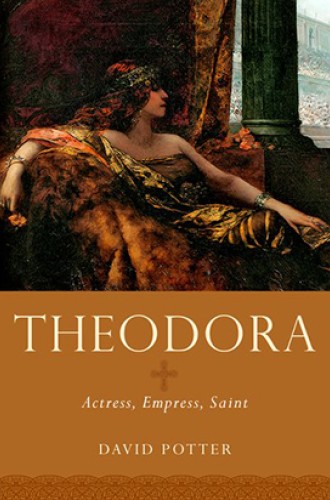Saint or devil incarnate?
Rare is the mother, I suspect, who would like to be known to posterity only by what her son has written about her—as is the case for Augustine’s mother, Monica. It would be worse for someone to be known predominantly from the writings of a man who hated her, as is the case for Theodora. Although today Theodora is a saint in the Syrian Orthodox Church, to the historian Procopius, her contemporary, she was the devil incarnate. David Potter, historian at the University of Michigan, takes up the challenge of understanding Theodora by painstakingly reconstructing the class, cultural, theological, and social setting in which she lived.
Potter contends that some of Procopius’s spiteful comments about her derive from sixth-century gossip. Other stories Potter interprets as “historical evidence light.” Procopius’s tales about Theodora may not be literally true, but they “reveal what people thought her capable of.” Procopius “tends not to make things up from scratch, . . . but [he] embellishes.”
Read our latest issue or browse back issues.
Potter words his evaluations carefully, on occasion almost evasively, as when he writes that some of the allegations about Theodora’s behavior are “not inherently implausible” but must be taken “with a large grain of salt.” Yet Potter pronounces some of Procopius’s other stories about Theodora “thoroughly believable.”
Potter presents Theodora as a kind of Margaret Cho figure. She was an actress, comedian, and sometime prostitute who became a wealthy empress with “a deep compassion for the poor, the deserted, and the destitute.” She was not “a mere extension of her husband,” Justinian, but “a ruler in her own right.” Her concern for the poor and the weak frequently evolved into policy. For example, she is credited with passage of a law against child prostitution.
Theodora and Justinian lived a long time before Lord Acton pronounced his dictum that “power tends to corrupt, and absolute power corrupts absolutely.” For the peasant’s son and the bear trainer’s daughter, power could not be taken for granted but had to be frequently demonstrated. Imperial power was made visible by control of the barbarians, establishment of proper worship of God, ordering of the empire’s legal code, and an ambitious building program.
Justinian’s powerful fist was also evident in his measures against heretics and against men who engaged in homosexual relations. Transgressive sexual conduct was seen as causing God’s anger and resulting in several major earthquakes. Such “religious deviants” were punished with flogging and castration, “sometimes inflicted with such brutality that the victims died.”
Potter describes well the bewilderingly tangled web of Justinian’s power:
Moments of innovation were followed by bursts of reaction; the ramifications of local scandals, the unintended consequence of imperial intolerance, spread across the empire; magnanimity clashed with brutality; the regime failed to offer a coherent vision of the new future.
In AD 522, Justin (Justinian’s predecessor) legalized marriages between former actresses and men of high status. Potter considers this law “one of the most important pieces of evidence” for solving “the mystery of who the real Theodora was.” The law was sympathetic to the plight of women who “left their evil and dishonorable choice behind and, embracing a better life, gave themselves to respectability.” The law stipulated that women like the young Theodora should be able to petition the emperor “for the right of legitimate marriage.”
The mosaic of Theodora in Ravenna’s Basilica of San Vitale compounds symbolic images to demonstrate her authority. The image of the three wise men embroidered on her purple robe is a reference to her role as representative of the Virgin Mary, who interceded with Christ as Theodora interceded with the emperor. Adorned with gold, from her jewelry to the gold vessel she carries, she displays imperial wealth. She is surrounded by her court. At her left an attendant draws aside a curtain that had covered a dark opening, indicating, as does the niche in which she stands, that Theodora had died before the mosaic was completed. A mosaic portrait of Justinian and his retinue appears alongside that of Theodora.
Imperial power was also made visible in court ritual. Procopius describes what occurred when anyone entered the court:
Everyone, including those of patrician rank, had to make their entrance by falling straight on the ground, flat on their faces; then, stretching their arms and legs out as far as they would go, they had to touch with their lips, one foot of each of the two.
Justinian’s law banning the Blues and the Greens—the factions that played a large role in social unrest—was largely ineffective. Potter asks, “What was Justinian actually thinking when he approved it?” He answers, “It might be that he was simply being foolish—never something that can be discounted in any time or place.” Thus Potter comments on many historians’ relentless efforts to find logic in the actions of their historical subjects. As if considering the recent American presidential campaign, Potter remarks that even in the sixth century, “claiming that, by seeking to restore past glories, one was moving forward was hardly new.” The interest of Theodora lies not only in Potter’s evidence, but also in his skillful historical method in dealing equitably with a daunting subject.







